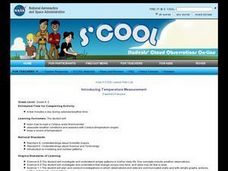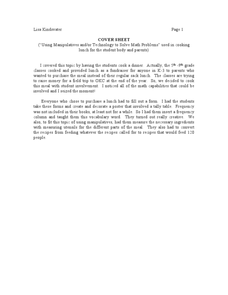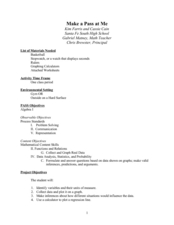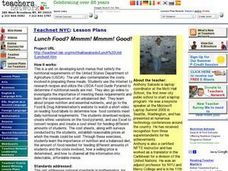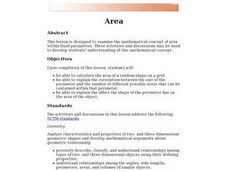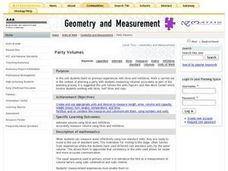Curated OER
Introducing Temperature Measurement
Students explore temperature and use Celcius thermometers to measure and graph the temperature in the classroom daily. They estimate what they think the temperature might be and then find the actual temperature in the room.
Curated OER
Numeric Response Problem
In this square units learning exercise, 3rd graders complete word problems about the amount of square units shown. Students complete 10 problems.
Curated OER
How Much is a Pound? A Weight Lesson
Fourth graders explore weight in pounds. In this measurement lesson, students estimate the weight of teacher-provided objects, measure the actual weight of the objects using scales, and discuss food products sold by the pound. This...
Curated OER
"Using Manipulatives and/or Technology to Solve Math Problems" by Cooking Dinner
Students explore math functions by preparing a meal. In this food measurement lesson, students examine a recipe for a meal and alter the size of the recipe based upon the amount of servings needed. Students utilize manipulatives to...
Curated OER
Introducing Trigonometry
Eleventh graders explore the three basic trigonometric functions. In this trigonometry/Algebra II lesson, 11th graders use GeoGebra and the unit circle to define the ratios of sides is a right triangles as they examine the full domain...
Curated OER
Measurement
Fifth graders measure specified distances when given perpendicular lines. In this measurement lesson plan, 5th graders draw the lines themselves.
Curated OER
Working with Cuisenaire Rods In Mathematics
Fourth graders learn the numerical value of each underlined letter of the standard Rod Code and develop systematic usage for building new units.
Curated OER
Linking Algebra to Temperature
Students convert between two units as they calculate the temperature. In this algebra lesson, students collect data on seasonal climate and create a graph. They make conjectures based on their data collection.
Curated OER
ExplorA-Pond:4th Grade Perimeter Estimation
Fourth graders visit a real pond. They mark the pond's curvilinear perimeter using string. They measure the string to find the actual perimeter of the pond.
Curated OER
Making Metric And Customary Rulers
Students create a ruler for the purpose of measurement using the standard and metric systems. The rulers are of different lengths and are compared to one another. Then students make conversions of different lengths using both systems of...
Curated OER
Make a Pass at Me
Students identify different types of functions and units of measurements. In this statistics lesson, students will collect data, graph their data and make predictions about their data. They plot a linear regression graph.
Curated OER
"How Do You Measure Up?"
Fourth graders explore basic measurements by analyzing their own bodies. In this human anatomy lesson, 4th graders identify the units used to measure a human body such as centimeters, inches, ounces and pounds. Students complete a...
Curated OER
What Is Your Measure
Students engage in the study of measurement. They practice using different objects that can be found in class or brought from home. Students are introduced to the history of measurement. They compare and contrast the standard and metric...
Curated OER
Measurements Around the Classroom
Third graders practice measuring items by examining classroom objects. In this geometry lesson plan, 3rd graders utilize measuring tools to find the weight, time, length or temperature of specific classroom items. Students predict the...
Curated OER
Lunch Food? Mmmm! Mmmm! Good!
Examine how nutrition plays an important role in our lives by conducting online research and developing lunch menus that satisfy nutritional requirements set up by the United States Department of Agriculture. Students download recipes,...
Curated OER
“I Can” Common Core! 6th Grade Math
Help your sixth graders reach their Common Core math standards by providing them with a checklist of "I can" statements for each standard. As each concept is covered, kids can check it off, as long as they can do what it states.
Curated OER
Area Applet
Elementary math classes calculate the area of a shape and explain the correlation between the size of the perimeter and the areas that can be contained within that perimeter. They also explain the effect the shape of the perimeter has on...
Teach Engineering
Bone Density Challenge Introduction
Can you use X-rays to measure bone mineral density? This is the essential question that learners must answer in the first installment of a seven-part series. They brainstorm ideas about necessary background information and what they...
Albert Shanker Institute
Economic Causes of the March on Washington
Money can't buy happiness, but it can put food on the table and pay the bills. The first of a five-lesson unit teaches pupils about the unemployment rate in 1963 and its relationship with the March on Washington. They learn how to create...
Curated OER
Basic Measurement for Welding
Young scholars accurately measure pieces of metal. After reviewing basic math principles, groups of students identify proper and safe use of measuring devices. They discuss the safety procedures for other devices in the classroom. After...
Curated OER
Party Volumes: Measurement
Second graders explore liters and milliliters. They estimate volume and accurately measure the volume. Students plan a party and measure volume using liters and milliliters as part of the planning process.
Curated OER
Measuring to the Nearest Inch
Third graders use whole numbers and fractions to make connections between abstractions of the mathematical world and the real world. In this fractions and measurement lesson, 3rd graders identify, quantify groups , and measure distances....
Curated OER
Measuring the Classroom
Students measure their classroom and determine the area. They discuss the margin of error. Each class member will write up their results separately. Students must decide what measurements to make, and attempt to measure accurately.
Curated OER
Time Zones in the United States
Eighth graders explore how to use the time zones in the United States and internationally. They use elapsed time to solve problems. Students calculate the time in various places in the United States. They discuss the 6 time zones in the...


